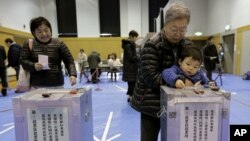Japanese voters are casting ballots Sunday in parliamentary elections that analysts say could return once-dominant conservatives to power after three years of center-left rule.
Pre-election polling by major Japanese newspapers show the conservative Liberal Democratic Party -- led by hawkish former Prime Minister Shinzo Abe -- in line to win the majority of seats in the 480-member lower house of parliament.
An LDP win would bring in a government promising a tough stance with China over territorial disputes in the Pacific, and government backing for a pro-nuclear energy policy, despite Japan's 2011 nuclear catastrophe.
Challenger Abe has also called for more spending on public works initiatives to pull Japan's once-vibrant economy from its fourth recession in the past 12 years.
The polls also showed voter displeasure with incumbent Prime Minister Yoshihiko Noda's push to double the country's sales tax -- a move Noda claims is necessary to meet rising social security costs in a country with a rapidly aging and shrinking population.
Japan remains in a two-decade economic slump, and voter dissatisfaction in 2009 allowed Noda's DPJ party to wrest power from conservatives who had dominated Japanese politics for most of the post-World War two era.
Since the landslide DPJ win, critics say the party has failed to deliver on a series of promises, including vows tocrackdown on wasteful government spending, and promises of cash incentives to encourage young couples to start families.
Pre-election polling by major Japanese newspapers show the conservative Liberal Democratic Party -- led by hawkish former Prime Minister Shinzo Abe -- in line to win the majority of seats in the 480-member lower house of parliament.
An LDP win would bring in a government promising a tough stance with China over territorial disputes in the Pacific, and government backing for a pro-nuclear energy policy, despite Japan's 2011 nuclear catastrophe.
Challenger Abe has also called for more spending on public works initiatives to pull Japan's once-vibrant economy from its fourth recession in the past 12 years.
The polls also showed voter displeasure with incumbent Prime Minister Yoshihiko Noda's push to double the country's sales tax -- a move Noda claims is necessary to meet rising social security costs in a country with a rapidly aging and shrinking population.
Japan remains in a two-decade economic slump, and voter dissatisfaction in 2009 allowed Noda's DPJ party to wrest power from conservatives who had dominated Japanese politics for most of the post-World War two era.
Since the landslide DPJ win, critics say the party has failed to deliver on a series of promises, including vows tocrackdown on wasteful government spending, and promises of cash incentives to encourage young couples to start families.





